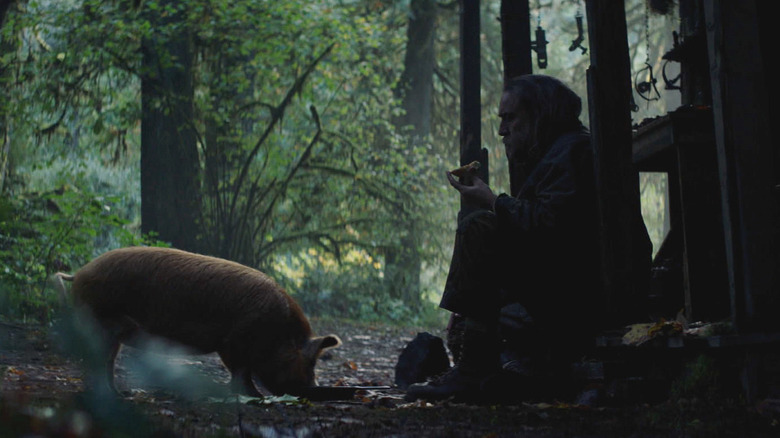Pig Review: That'll Do
If "30 Rock" was still on the air, the writers would have probably dreamt up a parody of the "John Wick" brand of character actor-driven revenge movies that would look a lot like "Pig." After all, the premise sounds like a throwaway gag at the expense of John Wick's gruesome quest to avenge his dead dog, as a reclusive truffle hunter heads back to the city to find the men who stole his beloved truffle pig. And with Nicolas Cage in the lead role as the truffle forager with a vengeance, you'd be forgiven for looking at the film from the outside and assuming it's a calculated attempt at making a cult movie, desperate for a lifetime of midnight screenings where audiences dress up as their favorite characters and yell lines back at the screen.
And yes, it's true that "Pig" makes for the strangest star-driven revenge movie since Charles Bronson's 1974 vehicle "Mr Majestyk," where a watermelon farmer had to protect his farm from being taken over by gangsters and corrupt cops. But to describe this as a stranger, artier variation on the high-concept action-revenge formula would do a disservice to director Michael Sarnoski's film, which proves to be at its strongest when it finally drops any intent of being a bloody thriller in this vein. This is a film that aims to explore what gets missing behind the gunfire in other films, transforming into a sombre and surprisingly moving tale of facing up to loss. It's a shame, then, that this revelatory development comes after a slog of an opening, that deliberately wrong foots the audience into expecting a slow-burning cousin to Keanu Reeves' beloved franchise.
Bringing home the bacon
In the Oregon wilderness, Rob (Nicolas Cage) is a truffle forager who thrives in solitude, with only his beloved pig for company. Since the death of his wife, the only person he's in constant contact with is Amir (Alex Wolff), who helps distribute his truffles to restaurants in Portland. One night, Rob's home is broken into, and his beloved pig is stolen — leading him to head back to the city for the first time in years in the hope of finding it. Reluctantly enlisting the help of Amir, he goes on a journey through the criminal underworld and the city's restaurant scene, to find who would want to have taken such a prized animal from his possession. As their search continues, Rob's history as a celebrated chef in the city's food scene catches back up with him, and he's unable to escape the memories of a family life he had to leave behind a decade earlier.
It's about as nuts and bolts a plot as you can expect from this type of movie, and "Pig" is at its weakest when it plays directly into these genre preconceptions. The first act, in which Rob's quest leads him initially to a scene straight out of a bad "John Wick" imitator, relentlessly beaten in a dark underground location as he demands answers, just feels like a moody reimagining of the genre's most simplistic beats, without the propulsive action required to make them work. Cage's turn as Rob is one of his most downplayed in quite some time — there are a couple of amusing line readings, but the actor innately understands that this film wouldn't work quite as well if Rob spoke and behaved like a conventional action hero. It's why the film around him is so initially frustrating, not subverting expectations so much as just sticking to them in the most overbearingly serious fashion.
Playing off against a monosyllabic Cage, who rightfully refuses to ham it up in this "Pig," only makes Alex Wolff's performance seem insufferable by comparison. If this were a mainstream action comedy, he'd be the clear motormouth sidekick — here, he doesn't exactly speak a mile a minute, but his audience surrogate character feels like an unwelcome distraction to the subtle work Cage is doing. This is more a fault of Michael Sarnoski's screenplay than the performance itself; the character of Amir only serves the practical function of informing Rob where his truffles have been distributed, to help him round up a set of culprits who may have stolen his pig for their own game.
He has family ties to another former associate of Rob's, but this isn't introduced as a revelation that dramatically alters the course of the narrative either. Amir feels like a character that could have been scrapped in a clear rewrite, who could have just given Rob a list of names and addresses, before disappearing from the action. Instead, he's an ever-present annoyance, and Alex Wolff often feels like he's performing with a knowing smirk, acting like a sidekick in an offbeat Nicolas Cage buddy comedy despite the lack of jokes on the page. There's been a lot of social media discourse recently about actors who "understand the assignment" when it comes to taking on roles, with seemingly every performer under the sun celebrated in a viral tweet at one point or another. After seeing all that, it's surprisingly refreshing to see somebody frequently misjudge the kind of film they're in, only serving to make the lead performance feel stronger by comparison.
Not complete hogwash
"Pig" finally starts to find its feet when Rob is reintroduced to figures from his past. The film's best scene comes as Rob and Amir visit a restaurant serving truffles found near Rob's house, slowly revealing that Rob not only knows the head chef, but that the chef initially worked for him in his restaurant 15 years earlier. It's a tremendously executed moment of transforming escalating tension into something more poignant, the sequence helping to change the dramatic course of the rest of the movie, as it becomes more of a rumination on themes of loss and grief. It is significantly more satisfying in this mode than it ever could be as a straightforward revenge romp.
It may prove frustrating for viewers feverishly anticipating a Nicolas Cage pig theft movie that the missing pig turns out to become more of a metaphor for a larger sense of loss, but Sarnoski's film proves moving despite the silliness of its high concept. Lame stand-up comedians will always do routines about how movie plots would really occur if they took place in real life, and while "Pig" couldn't be described as grounded realism, it does get to the emotional truth of its central loss in a way the revenge movies it's imitating seldom do. In "John Wick," the titular character starts planning how to get his revenge immediately after being left for dead, his trigger-happy rampage overshadowing any lingering emotional introspection despite his family getting taken away from him. "Pig" is a film about transitioning from a feeling of anger to a different stage of grief — it has missteps along the way, but gradually becomes deeply moving by the second half.
It takes a while for "Pig" to reveal its distinctly moving charms, and even then they don't entirely make up for a first half torn between quiet character study and poor imitation of the genre it's setting out to subvert. It's undeniably moving by the final act, but up until then, "Pig" feels like a less than assured directorial debut.


